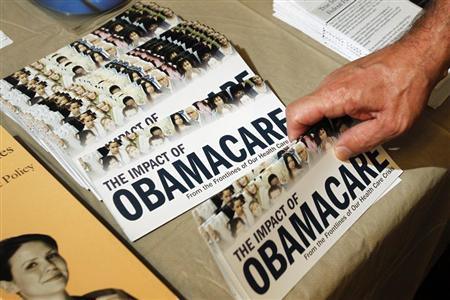- Joined
- Feb 26, 2012
- Messages
- 56,981
- Reaction score
- 27,029
- Location
- Chicago Illinois
- Gender
- Male
- Political Leaning
- Private
Days after delaying health insurance requirements for employers, the Obama administration has decided to roll back requirements for new state online insurance marketplaces to verify the income and health coverage status of people who apply for subsidized coverage.

President Barack Obama's healthcare reform law is slated to begin offering health coverage through state marketplaces, or exchanges, beginning October 1. But to receive tax subsidies to help buy insurance, enrollees must have incomes ranging from 100 percent to 400 percent of the federal poverty line and not have access to affordable insurance through an employer.
Until now, the administration had proposed that exchanges verify whether new applicants receive employer-sponsored insurance benefits through random checks. It also sought to require marketplaces to verify each enrollee's income status.
But final regulations released quietly on Friday by the Department of Health and Human Services (HHS) give 16 states and the District of Columbia, which are setting up their own exchanges, until 2015 to begin random sampling of enrollees' employer-insurance status. The rules also allow only random - rather than comprehensive - checks on income eligibility in 2014.
The changes, which point to new technical and bureaucratic challenges at the state and federal levels, raise new questions about the how successfully Obama's Patient Protection and Affordable Care Act will be implemented. The law is scheduled to go into effect on January 1. But the administration's latest move acknowledges that exchanges need extra time to get their verification systems in place.
The regulations, contained in a 606-page HHS rule, allowed state-run exchanges to accept an enrollee's "attestation regarding enrollment in an eligible employer-sponsored plan." Marketplaces to be operated by the federal government in 34 states will still make random checks to verify applicant insurance status in 2014, it said.....snip~
U.S. relaxes health law income, insurance status rule for exchanges
Well.....According to Team Obama it an attestation and will be temp for projection on annual household income.
President Barack Obama's healthcare reform law is slated to begin offering health coverage through state marketplaces, or exchanges, beginning October 1. But to receive tax subsidies to help buy insurance, enrollees must have incomes ranging from 100 percent to 400 percent of the federal poverty line and not have access to affordable insurance through an employer.
Until now, the administration had proposed that exchanges verify whether new applicants receive employer-sponsored insurance benefits through random checks. It also sought to require marketplaces to verify each enrollee's income status.
But final regulations released quietly on Friday by the Department of Health and Human Services (HHS) give 16 states and the District of Columbia, which are setting up their own exchanges, until 2015 to begin random sampling of enrollees' employer-insurance status. The rules also allow only random - rather than comprehensive - checks on income eligibility in 2014.
The changes, which point to new technical and bureaucratic challenges at the state and federal levels, raise new questions about the how successfully Obama's Patient Protection and Affordable Care Act will be implemented. The law is scheduled to go into effect on January 1. But the administration's latest move acknowledges that exchanges need extra time to get their verification systems in place.
The regulations, contained in a 606-page HHS rule, allowed state-run exchanges to accept an enrollee's "attestation regarding enrollment in an eligible employer-sponsored plan." Marketplaces to be operated by the federal government in 34 states will still make random checks to verify applicant insurance status in 2014, it said.....snip~
U.S. relaxes health law income, insurance status rule for exchanges
Well.....According to Team Obama it an attestation and will be temp for projection on annual household income.

